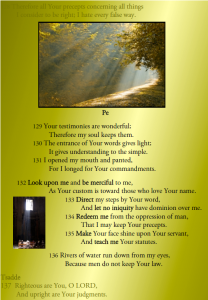 One easy way to get a feel for the flow of thought in many sections of Psalm 119 is to mark the psalmist’s requests of God. Several of the sections are noteworthy either for an abundance of verbs in the imperative mood (He, vs. 33-40) or for a complete absence of them (Mem, vs. 97-104). The Pe section can be neatly divided along these lines: there are no such verbs in the section’s first three verses, and then seven packed into the next five. So, as George J. Zemek says, “verses 129-131 are affirmations about the Word of God, while verses 132-135 contain petitions delivered to the God of the Word” (The Word of God in the Child of God). A final petition-less verse rounds off the section.
One easy way to get a feel for the flow of thought in many sections of Psalm 119 is to mark the psalmist’s requests of God. Several of the sections are noteworthy either for an abundance of verbs in the imperative mood (He, vs. 33-40) or for a complete absence of them (Mem, vs. 97-104). The Pe section can be neatly divided along these lines: there are no such verbs in the section’s first three verses, and then seven packed into the next five. So, as George J. Zemek says, “verses 129-131 are affirmations about the Word of God, while verses 132-135 contain petitions delivered to the God of the Word” (The Word of God in the Child of God). A final petition-less verse rounds off the section.
Zemek also notes that the term “the simple” (vs. 130) is used in the Bible both positively and negatively, and that “context must determine whether the term is being used in a derogatory or a commendable way.” Factors in the determination of the commendable version, he says, include humility, dependence on God, and teachability.
Are we wise or simple? It would probably be wisest (and safest) to assume that we’re a lot more firmly entrenched in the “simple” category than we’ve always given ourselves credit for. It’s probably an accurate assumption anyway (see Paul’s tactful words to the Corinthians); and surely the best way to avoid the fool’s mistake of overestimating his wisdom is to do our best to underestimate (if possible) our own.
For consider your calling, brothers: not many of you were wise. . .
(1 Cor. 1:26-27, ESV)
Such knowledge is too wonderful for me;
It is high, I cannot attain it. (Ps. 139:6 )
Surely I am more stupid than any man, and do not have the
understanding of a man. I neither learned wisdom not have
knowledge of the Holy One. (Prov. 30: 2-3)
Lord, my heart is not haughty, nor my eyes lofty.
Neither do I concern myself with great matters,
Nor with things too profound for me. (Ps. 131:1-2 )
Never be wise in your own sight. (Rom 12:16, ESV)
Assorted observations:
129 Zemek points out that an appreciation of God’s testimonies is “logically” followed by obedience to them.
130 The word lets in light like the opening of a door to a dark room.
131 “I opened my mouth and panted” is reminiscent of Ps. 81:10 : “Open your mouth wide, and I will fill it.”
132 and 135 both remind us of Numbers 6:25: “The Lord make his face shine upon you. . .”
133 Zemek again: “Note that a new metaphor. . ., ‘my footsteps,’ is added to a stockpile of word-pictures relating to the rigorous road of life.”
134-135 Alexander Maclaren points out the lofty motives of the psalmist in asking God’s help: ”It is a high attainment to desire deliverance from men, chiefly in order to observe, unhindered, God’s commandments. And it is as high a desire to seek the light of God’s face mainly as the means of seeing His will more clearly.”
Image courtesy of dan / FreeDigitalPhotos.net
